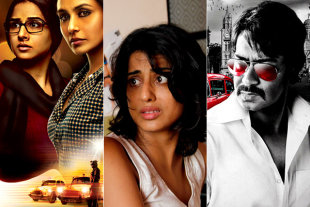
But 'No One Killed Jessica' cleverly managed put out a disclaimer describing the film as "a hybrid of fact and fiction". The film scored with the audience as it did not delve too much into Jessica Lall's past and stuck only to the investigation and the trial. If you overlook the over the top characterization of Rani Mukherjee as a high flying scribe, barking orders at the juniors and overturning her boss' orders and other loopholes, this is a good film to watch.
But have our directors completely lost the plot that they have to be heavily 'inspired' by real life incidents? The reason could be that for years, options like cable television and Hollywood have hardened audiences to the old formulas a la Karan Johar films and Bollywood producers and directors are striving to create a new idiom that retains the charm of the genre's classics but should have enough spunk to pack theatres. With a few exceptions, they've failed. So while Apoorva Lakhia's 'Shootout at Lokhandwala' (which is 'very loosely based' on gangster Maya Dolas) sells, RGV's 'Rakta Charitra' (based on the life of Paritala Ravindra a political leader from Andhra Pradesh) failed.
But these are not the only films which have stirred and shaken the genre. Right from Gulzar's 'Aandhi' which was rumoured to be based on the life of Indira Gandhi (and led to the film being banned during Emergency) to 'Alert' based on Nira Radia and 2G scam, sticking to telling just the story has always been a big task.
If you go by the number of 'reality based' films that Bollywood has started churning out, it quickly becomes clear that this is actually where the most experimental film-makers are setting up shop. Some succeed to hard sell it to the audience while others change their wares. Much of Milan Lutharia's chutzpah for 'Once Upon a Time in Mumbai' comes from the source material, in this case, a mishmash of legends and history on the lives of Haji Mastan and Dawood Ibrahim. Haji always chose to wear pure white designer wear and carried a pack of imported cigarettes in hand like Ajay's character in the film.
Perhaps one film which stuck entirely to the facts would be Anurag Kashyap's 'Black Friday'. For those who have read S. Hussain Zaidi's book `Black Friday' (which was based on the 1993 Mumbai blasts), it would be hard to imagine it being translated into a film without compromising on the nature of the narrative. That is, until you see Anurag Kashyap's film where the movie follows the same fractured structure of the book and is even divided into chapters.
Real cinema is a label that still carries a lot of weight. Everyone is trying to lay claim to the new Bollywood, whether through poorly written films like 'Monica' or savvy hits like 'Once Upon…'. So it is hardly a surprise when Ramgopal Varma decides to the approach the killer dame (quite literally) Maria Susairaj to make her presence felt in 'Not a Love Story', a 'true life account' on how she and her fiancé killed Neeraj Grover and chopped him to pieces. Trust RGV to be always there stroke the voyeurism, be it casting a killer or taking a stroll in the Taj Mahal Hotel (for inspiration, he said) after the gruesome 26/11. But then, as John Lennon had rightly said once that 'reality leaves a lot to the imagination' and films are after all not a history lesson.
No comments:
Post a Comment